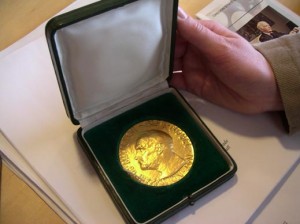Nobel Peace Prize 2010
Chinese dissident Liu Xiaobo has been awarded the Nobel Peace Prize in an Oslo ceremony derided by Beijing as a farce.
Mr Liu has dedicated the prize from his prison cell to the ‘lost souls’ of the 1989 Tiananmen Square crackdown.
“We can to a certain degree say that China, with its 1,3 billion people is carrying mankind’s fate on its shoulders” – Norwegian Nobel committee chairman Thorbjoern Jagland said in a speech before 1.000 guests in the richly decorated City Hall.
“If the country proves capable of developing a social market economy with full civil rights, this will have a huge favourable impact on the world. If not, there is a danger of social and economic crises arising in the country, with negative consequences for us all.”
The absence of the laureate, sentenced last year to 11 years jail for subversion, was symbolised at the ceremony by an empty chair and a large portrait.
Mr Jagland placed the prestigious award on the empty chair, explaining it was impossible to hand it to Mr Liu or any of his close family members, who were prevented from travelling to Oslo for the ceremony.
Serbia had initially caved in to Chinese pressure to boycott the Nobel Peace Prize ceremony in Oslo, but sharp criticism by the European Union forced it to rethink its position: Not least due to its own EU ambitions.
European Union enlargement commissioner Stefan Fuele criticized Serbia’s original decision to boycott the Nobel Peace Prize ceremony sharply.
Standing alongside Serb Prime Minister Mirko Cvetkovic, he said that the EU ‘regrets the decision of Serbia not to attend’ the ceremony and added that Serbia was ‘expected to embrace euro values and coordinate’ with partners.
His words had a deep impact – while the foreign minister of Serbia had originally defended the country’s decision not to attend the ceremony, Serbia decided to send its ombudsman for human rights, Sasa Jankovic, to Oslo.
Serbia was the only EU candidate that originally decided to stay away from the ceremony honoring Chinese human rights activist Liu Xiaobo.
After the announcement of this year’s laureate, China had protested against the Nobel committee’s decision and had urged other countries to boycott the ceremony. Serbia followed China’s call, as it relies on Chinese government support for Serbia’s opposition to an independent Kosovo.
Jailed WikiLeaks founder Julian Assange should be awarded the Nobel Peace Prize, Russian officials said this afternoon.
The Kremlin urged non-governmental organisations to consider “nominating Assange as a Nobel Prize laureate”.
A source from inside president Dmitry Medvedev’s office told Russian news agencies: “Public and non-governmental organisations should think of how to help him.”
“Maybe, nominate him as a Nobel Prize laureate.”
The statement appeared to be designed to antagonise Washington over leaked US diplomatic cables.
Elsewhere, Russian prime minister Vladimir Putin lashed out at the United States, saying the West had no right to preach to Russia about democracy.
When asked about cables which cast him as Russia’s “alpha-dog” ruler of a corrupt and undemocratic bureaucracy, Putin snapped: “Do you think the American diplomatic service is a crystal clean source of information? Do you think so?”
He then went on to criticise the West over the arrest of Assange, who turned himself in to the authorities in Britain this week.
“If it is full democracy, then why have they hidden Mr Assange in prison? That’s what, democracy?”Putin said.
